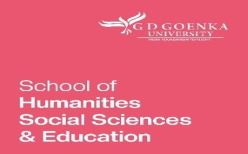.jpg)
The complete meaning of the shloka depicts the eternal goal of knowledge acquisition is that the enlightenment obtained through the acquisition of complete and true knowledge gives the bearer discipline and manners.
According to Webster’s dictionary, to “know” is to “hold something in one’s mind as true [on] a sound logical or factual basis.” By extension, knowledge refers to the “fact or condition of knowing something with familiarity gained through experience or association" A cluster of such ways of knowing or knowledge system is an organized structure and dynamic process of generating and representing knowledge across domains that connect ways of knowing to ways of doing. It is made up of actors, institutions, and practices to organize the production, transfer, and use of knowledge. The domain of Indian Knowledge Systems (IKS) are rooted in the cultural experiences of a community as a result of its constant interaction with its ecosystem. Traditionally, IKS like most ancient knowledge system were transferred through oral tradition with its focus of constitution in the inner self. This antarmanah assembles the experiences of our sensory input (indriyas), which is then processed into perceptions by our mind (mana) and intellect (buddhi) to constitute transformatory knowledge to bring about an actualized self, citta.
Within IKS, unlike modern science, knowledge formation is not merely objectively verified intersubjective perception of the senses and the mind. Herein, deep meditative reflection through chintana and manan is the loci of knowledge formation and the process of learning. This mode of knowledge production has been widely applied to multiplicity of disciplinary
field that includes philosophy, ethics, logic, grammar, geometry, arithmetic, astronomy, geography, political-economy and state-craft, metrics, physical and biological sciences, military strategy, metallurgy, literature, plant and veterinary science among others.
The structure of traditional knowledge, its delivery system, its widespread application, and utilization, and ultimately the ways of integrating this knowledge system into higher education are some of the new areas of understanding. The Indian knowledge system is a confluence of three key ideas i.e. Darshana or the point of view which leads to Jnana or development of knowledge from a specific perspective which then progresses to organization and systematization of knowledge for the purpose of reflection and pedagogy then it is called Vidya or the discipline.
The knowledge is thereby categorized into Para Vidya and Apara Vidya (Mundakopanishad) and furthermore the distinction is carried out to establish the streams of Jnana and Vijnana
wherein the latter explores the tangible, and observable phenomenon of the perceptible world while the former engages with the experiential facts. Both the experiential knowledge and experimental knowledge require preparation and exploration of either the inner self or the outer world.
There is a widespread need for pedagogical interventions to understand and instil the complexities of the Indian Knowledge System at all levels of academia. Exploring pedagogical interventions to understand various techniques of transmitting IKS content to learners and its seamless incorporation across various curriculum of Higher Education necessitates the attention of various stakeholders.
This symposium takes the tradition of Tarka forward to achieve an enhanced understanding of the ways and means in which Indian Knowledge Systems may be incorporated into the curriculum and pedagogy of the higher education in India. It explores the sub-domains of Education, and Global Knowledge Exchange; Relevance of Ancient Vedic Texts; Ecologically Sustainable Practices, Value Systems, Healing Practices, Science, Society, and Polity and of Language Networks in India.
GD Goenka University: The GD Goenka Group, is a leading educational setup driven by a passion for excellence in education and quality in life, where Globalization and Internationalization are the buzz words. A galaxy of educational institutions from pre- schools to post – graduate institutes, with world class infrastructure, salubrious and well maintained Wi-Fi enabled campuses, well-equipped libraries and Hi- tech laboratories and a dedicated and seasoned academics, support an ideal and conducive environment for providing education that can be benchmarked against the best in the world.
School of Humanities Social Sciences and Education: The Humanities Social Sciences and Education constitutes a whole universe of intellectual domains, spanning the entire range of knowledge pertinent to human relationships, our history and prospects for the future. The School of Humanities and Social Science has been established with an aim to empower the learners to systematically understand and reflect on social, political, cultural and economic structures and processes. The school is committed to provide an interdisciplinary and integrative pedagogical interface to learners so as to nurture them into complete and competent human beings.
The quality, vitality and innovation of our programs remain unsurpassed, providing the foundation and opportunity for students not only to succeed, but to shape the future of the country. With advanced infrastructure, unique holistic curriculum, well equipped library, skilled plus thoughtful faculty, international exchange programmes, lively co-curricular activities, the school creates an environment to maximize learning and facilitate all round development.
Chief Patron : Mr. Nipun Goenka MD, GD Goenka Group
Co-Chief Patron : Prof. (Dr.) Tabrez Ahmad., Vice-Chancellor GD Goenka University
Event Chairperson : Prof. (Dr.) Anjali Midha Sharan Dean, SoHSE & Dean, R&D GD Goenka University
Core Committee : Dr. Anuradha Tiwari, Dr. Parvesh Lata, Dr. Imran Amin, Dr. Parul Mishra, Dr. Sakshi Kaul, Dr. Pallavi Beri, Dr. Rimple Manchanda.

.jpg)